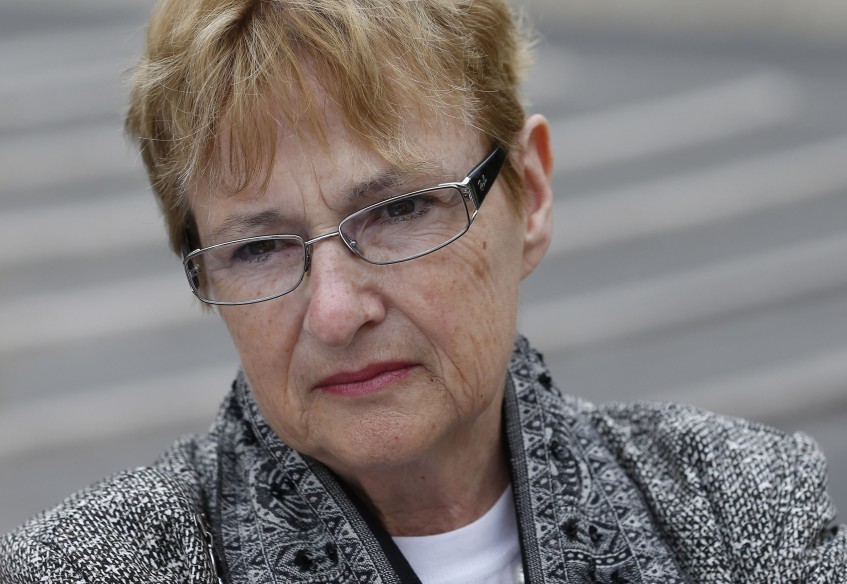Dr Maria Harries speaks on Church and family

The appointment of prominent West Australian, Dr Maria Harries, as independent auditor to the Synod of Bishops on the Family currently taking place at the Vatican in Rome, was met with overwhelming approval by many within the Archdiocese of Perth, Archbishop Costelloe first and foremost among them. PHOTO: CNS/Paul Haring
By Marco Ceccarelli
The appointment of prominent West Australian, Dr Maria Harries, as independent auditor to the Synod on the Family in Rome was met with overwhelming approval by many within the Archdiocese of Perth, Archbishop Costelloe first and foremost among them.
Reflecting on the impact she is hoping to make, Dr Harries recently spoke to the eRecord from Rome about her experience as a participating Catholic laywoman within one of the most significant ecclesial events of the year.
Dr Harries commented on a number of aspects of the mission of the family that she would like to see improved, as well as her hopes for a more supportive Church – particularly towards those who have strayed and have felt excluded and betrayed by some of its members.
“An honour, a privilege and an enormous responsibility,” said Dr Harries in describing her appointment as independent auditor for the 14th General Assembly of the Synod of Bishops.
“As I asked ‘why me’, I was reminded of the response that Sister Sheila Sawle RSM made to me when she asked if I would chair MercyCare WA so many years ago. She said ‘because the Spirit wants you there’.”
As chair of Catholic Social Services Australia and member of the Truth, Justice and Healing Council, Dr Harries has had years of experience dealing with issues faced in family life and is acutely aware of the challenges faced both within the family and due to external factors.
She hopes that the synod, which is focused on the vocation and mission of the family in the Church and in the contemporary world, will address both the importance and beauty of the regular family, headed by a mother, father and children, as well as other ways of thinking and being a family.
“No family is exactly the same as another,” Dr Harries said.
“Our Aboriginal peoples have been at pains to explain to us how different is their concept of family – it is a kinship group. We all know there are many families which are headed by a single parent. Many couples do not have children.
“We also know that many grandparents are now rearing grandchildren – sometimes with and often without the presence of a parent,” she added.
Dr Harries went on to say that, if the opportunity of her making an intervention at the synod arose, she would focus on three issues in particular:
- the needs of families which are struggling and feel excluded from the Church
- the significance of a wider concept of family as per that in the cultural wisdom and heritage of Aboriginal and Torres Strait Islander traditions
- the significance of the Church accompanying the paths of those who have been hurt and damaged by members of the Church.
She also shone a light on the difficulties faced by those struggling to live their faith while facing severe family problems that are often out of their control.
“The problems facing families today as they struggle to rear children and remain faithful to their values and their faith are enormous.
“Forty or more years working with families in so many roles has given me the greatest regard for the strengths in families and a huge respect for their capacity to hold, love and cherish despite so many obstacles.
“I have also seen the worst of what families can do. My hope is that I can hold a balance between these two realities,” she said.
Dr Harries further expressed a desire to represent the views of the poor and homeless, as well as those whom she says the Instrumentum Laboris (a working document for the synod outlining the subjects for discussion) defines as “irregular” families.
“Those who have inter-faith and inter-cultural marriages, those who have divorced and formed another family and those who have not married either civilly or in the Church and who ‘live together’: all of these are families and all need the pastoral support of our Church.
“It is the view of a number of people in our services that some of these families do not feel welcome in our Church and, indeed, they feel judged. In my view, it is urgent that we understand how to respond to a very different social landscape than that of ten years ago,” she said.
Concluding in much the same way that she began, Dr Harries commented on her hopes for the synod by pointing to the Holy Spirit, who she hopes will be a source of guidance for those addressing one of the more pressing issues of our time.
“My hopes are that the Spirit is active and that compassion and mercy find their ways into the hearts of the people of good heart and mind. There is much to gain if hearts are open and much to lose if they are frightened.”
